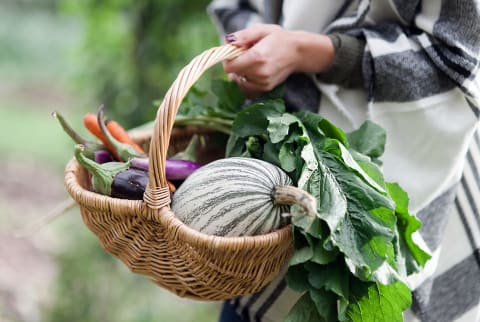Advertisement
This App Has Helped Almost 1 Million People Waste Less Food


It's an all-too-familiar scene: The end of the week is approaching and your fridge is filled with miscellaneous odds and ends—an apple here, half an onion there. They're perfectly fine to eat, but you know you won't have time to use them up before they go bad.
If only I could just hand this stuff off to someone who'd use it, you think, as you begrudgingly throw it into your trash can or compost pile in defeat.
Enter OLIO—a mobile app that makes it easier for people to share food within their communities.
How does the app work?
OLIO is basically Craigslist or Poshmark for your pantry: You snap a shot of the food you're looking to get rid of and add a time window and pickup location for handoff. Then, you wait and see if anyone is willing to take it off your hands. (The app's co-founders Saasha Celestial-One and Tessa Cook say that about half of all food added to the app is requested in less than an hour.) After hand-off, both parties can feel good: One person just did their part to waste less, the other just got some free food.
Cook and Celestial-One are longtime friends who were inspired to start the app when one of them was frustrated by the food she'd have to leave behind during a move. After conducting some informal research, the U.K.-based duo found that one in three people surveyed felt "physically pained" throwing away good food, so they knew they weren't alone.
Since the app's founding in 2015, around 900,000 people across 48 countries have subscribed, sharing over 1.3 million portions of food between them. Plus, the company has raised $8.2 million in capital, proving that sustainable operations like these can make business sense too.
Should I be using it?
When I downloaded the app to check it out, an assortment of items—everything from half a jar of jam to an unopened wine bottle to a bag of frozen peas—washed over my screen. Lucky users even could pick up cakes from nearby amateur bakers or plates full of leftovers from an overzealous meal prep. While the majority of the offerings were edible, there were miscellaneous items like plant pots, CDs, and moving boxes there too.
But sadly for me, the nearest pickup was 16.5 miles away. I reached out to Cook and Celestial-One to learn more about why the app hasn't caught on in NYC yet, and they explained that the majority of OLIO users still reside in Europe, but they're hopeful that a growing cohort of devotees in the states, mostly on the West Coast, will help spread the word and get more people involved in the movement.
I wondered if food safety concerns could be a barrier to entry for some, but Cook told me they have safeguards in place in the app's Terms & Conditions, which state that anyone who gives food that isn't up to par will be kicked off the platform. Each user also has a public profile, where they can be rated based on whether they accurately represented their items.
Restaurants, grocery stores, food stylists, hotels, and any other organization that cycle through a lot of food can sign on to OLIO too, and volunteers will come by to pick up anything that's on the brink of going bad. The volunteers can keep 10 percent of the haul, and the rest goes up on the app.
It feels like a natural extension of the sharing economy we now see in other categories—a transparent platform where people can share food, similar to how AirBnb allowed people to share their homes. I'd encourage anyone to download the app (it's free!) and see what the food landscape looks like around them.
Even though OLIO hasn't quite taken off in downtown Manhattan yet, I'm going to keep it in the hopes that more people sign on. In the meantime, I'm enjoying reading through its message board, filled with a really encouraging community of people sharing their low-waste tips, like how to deal with certain food scraps.
Ultimately, conversations like these could provide just the momentum we need to fix a broken food system. "As we look to the long term, our vision is an unashamedly bold one—it's of a world with billions of people using OLIO to share our most precious resource: food," Cook said. "The planet needs us to achieve this if we're to stand any chance whatsoever of mitigating the worst effects of climate change."